
We’ve all seen the infamous 52-card deck of Iraq’s Most Wanted constructed by the U.S. Department of Defense, but what if Hollywood formed their own deck of the most powerful directors in the industry? There are many outstanding directors that fit the bill for a top spot, but surely Martin Scorsese is more than worthy of being considered as one of American cinema’s four kings. Easily the most influential director of his generation, the Italian-American filmmaker has a résumé that most directors would kill for. That is, of course, as long as they could avoid that damn Oscar curse that seems to have haunted Scorsese ever since he was snubbed by the Academy in favor of Kevin Costner’s inferior period epic, “Dances with Wolves.”
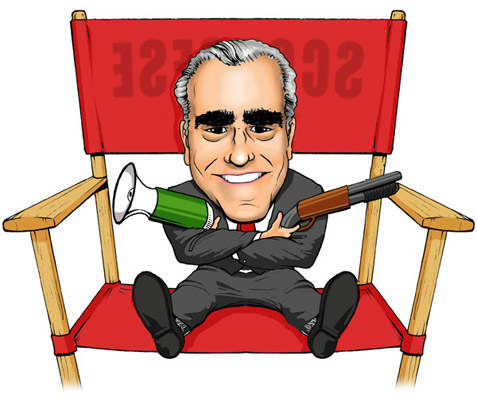
Illustration by Brian Smith. © 2007 Bullz-Eye.com, LLC
Born in a small neighborhood of Queens, New York on November 17, 1942, Scorsese spent most of his childhood days recovering from asthma at home. It was during this period that he developed his passion for cinema – particularly the neorealist movement (best highlighted by the Italian film “The Bicycle Thief”) and its eventual successor, French New Wave – and though his initial desire was to become a priest, Marty instead chose to attend New York University to study film. Following his graduation in the late ‘60s (which also marked the completion of his first feature film “Who’s That Knocking at My Door”) Scorsese became linked to several other upcoming talents from the new class of directors, namely Francis Ford Coppola, Steven Spielberg and Brian De Palma. It was the latter that introduced the young director to upcoming talent Robert De Niro.
It’s his relationship with De Niro that made Scorsese the man that he is today (and vice versa), and while their first project together (“Mean Streets”) was a bit of an underperformer at the box office, it marked a promising collaboration in what would eventually become one of the greatest team-ups in the history of film. Three years after the release of “Mean Streets,” Scorsese and De Niro went back to work on two new films: “Taxi Driver” and “New York, New York,” a high-concept musical that shared the honor of being both the director’s first big feature, as well as his first critical failure.
He quickly bounced back in 1980 with the release of “Raging Bull,” one of his most admired films to date, but finished out the rest of the decade with a pretty haphazard collection of projects. From the underappreciated black comedy, “The King of Comedy,” to the extremely dark “After Hours” – not to mention directing the music video for Michael Jackson’s “Bad” – Scorsese spent a lot of time experimenting in new genres, but never really expanding his audience. In 1988, he released his most controversial film yet, an adaptation of Nikos Kazantakis’ novel, “The Last Temptation of Christ,” which follows Jesus as he contemplates the sacrifice he was born to make. Taking almost a decade to make, Scorsese was forced to make several other movies (including the aforementioned “After Hours,” as well as the Paul Newman/Tom Cruise billiards film, “The Color of Money”) in order to secure the funding for his pet project. Curiously, while the film caused a great amount of debate for its apparently blasphemous subject matter, it helped to get the director back on the radar, and just in time, too.
In 1990, Scorsese returned to form with arguably the best film of his career: “GoodFellas,” the story of a small-time gangster (played by Ray Liotta) and his climb up through the ranks of the mob hierarchy. The film marked his third Oscar nomination for Best Director, and while many believed that the director (along with “GoodFellas”) would take home the golden statue, he was snubbed in both categories in favor of “Dances with Wolves.” Joe Pesci (another of Scorsese’s recurring actors), however, did walk away with the prize for Best Supporting Actor, so perhaps not all was lost.
After the commercial and critical success of “GoodFellas,” Scorsese continued his tear through Hollywood with an excellent remake (“Cape Fear”), an award-nominated return to the mobster genre (“Casino”), a film about the life of the Dalai Lama (“Kundun”), and the little-seen medical drama, “Bringing Out the Dead.” Following in his footsteps from the late 70s, Scorsese disappeared from the film scene for a few years in order to pursue some personal projects, but in 2002, he returned once again, and this time with recently retired actor Daniel Day-Lewis and new muse Leonardo DiCaprio for the period epic, “Gangs of New York.” As Scorsese’s relationship with DiCaprio strengthened, so did their collaborations, and two years later, the duo teamed up once again for the Howard Hughes biopic, “The Aviator.” And in what was fast becoming a disappointing pattern for the director, Scorsese was nominated for an Oscar for both films, losing both times.
His best hope for taking home that golden statue since “GoodFellas” has fallen in the hands of “The Departed,” a massively commercial remake of the cult Hong Kong thriller “Infernal Affairs.” While many felt that Scorsese had given up hope of ever winning an Oscar, audiences and critics alike have more or less guaranteed that his brilliant exploration of the Boston criminal underground will finally win the prize. And if he doesn’t, well, there are plenty more chances on the way, from the rumored Teddy Roosevelt biopic, starring DiCaprio as the 26th President, to the greatly anticipated drama “Silence,” about two Jesuit priests who travel to seventeenth century Japan under the Shogunate regime to check up on the evangelical mission.
In the end, it doesn’t really matter if Scorsese ever wins an Oscar or not. The man is a legend in his own right, and while some choose to honor him by ripping him off (Quentin Tarantino, I’m looking at you), and others by simply not honoring him at all (The Academy of Motion Picture Arts and Sciences), we do so by giving him a spot as a charter member of the Director’s Hall of Fame.
The Best of the Best
“GoodFellas”
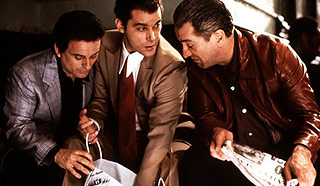 The ultimate Scorsese flick, “GoodFellas” has it all: sex, drugs, rock ‘n roll, and even a little bit of violence. Okay a lot of violence, but what is most impressive about the film is not only the manner in which Scorsese has pieced it all together, but his total disregard for just about every rule in the book. From the voiceover narration that accompanies a majority of the film to the frantic jump cuts that gradually become more consistent the more paranoid Henry Hill becomes, “Goodfellas” is positively littered with cinematic don’ts. Yet somehow, it works to the film’s advantage. And while it takes a lot more than a solid cast to churn out one of the best films of the ‘90s, “GoodFellas” definitely delivers. Featuring award-worthy performances, a classic rock ‘n roll soundtrack, and an excellent study on the sociological and psychological consequences of crime and violence, “GoodFellas” is hands down Martin Scorsese’s greatest cinematic achievement.
The ultimate Scorsese flick, “GoodFellas” has it all: sex, drugs, rock ‘n roll, and even a little bit of violence. Okay a lot of violence, but what is most impressive about the film is not only the manner in which Scorsese has pieced it all together, but his total disregard for just about every rule in the book. From the voiceover narration that accompanies a majority of the film to the frantic jump cuts that gradually become more consistent the more paranoid Henry Hill becomes, “Goodfellas” is positively littered with cinematic don’ts. Yet somehow, it works to the film’s advantage. And while it takes a lot more than a solid cast to churn out one of the best films of the ‘90s, “GoodFellas” definitely delivers. Featuring award-worthy performances, a classic rock ‘n roll soundtrack, and an excellent study on the sociological and psychological consequences of crime and violence, “GoodFellas” is hands down Martin Scorsese’s greatest cinematic achievement.
“The Departed”
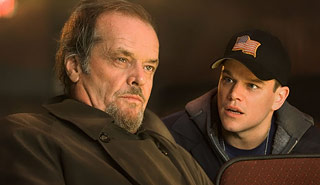 An instant classic. This isn’t the first remake that Scorsese has ever directed, but it’s by far his most commercial film yet. Based on the 2002 Hong Kong thriller “Infernal Affairs,” the story revolves around two undercover agents (a cop posing as a gangster, and a gangster posing as a cop) who are trapped in an enthralling game of cat-and-mouse, with both men looking to expose the other before their own cover is blown. Carefully following the basic outline of the original film (including key sequences and plot devices), “The Departed” does stray a bit from the source material, but it never loses focus. Perhaps what’s most interesting about the film, though, is that while Scorsese probably didn’t expect any nominations come awards time, he was more than deserving of them for the first time since “GoodFellas.”
An instant classic. This isn’t the first remake that Scorsese has ever directed, but it’s by far his most commercial film yet. Based on the 2002 Hong Kong thriller “Infernal Affairs,” the story revolves around two undercover agents (a cop posing as a gangster, and a gangster posing as a cop) who are trapped in an enthralling game of cat-and-mouse, with both men looking to expose the other before their own cover is blown. Carefully following the basic outline of the original film (including key sequences and plot devices), “The Departed” does stray a bit from the source material, but it never loses focus. Perhaps what’s most interesting about the film, though, is that while Scorsese probably didn’t expect any nominations come awards time, he was more than deserving of them for the first time since “GoodFellas.”
“Taxi Driver”
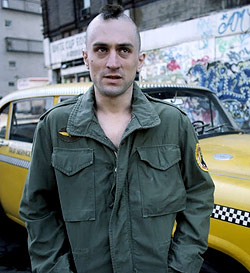 Second only to “The Last Temptation of Christ” as Martin Scorsese’s most controversial film, “Taxi Driver” quickly earned a reputation for having one of the most graphic action sequences of its era, not to mention featuring a subplot about a 13-year-old prostitute. It also made history five years later when John Hinkley Jr. blamed the film for his attempted assassination of then-President Ronald Reagan in a ploy to gain co-star Jodie Foster’s attention. Luckily, this never resulted in any sort of ban on the film, and instead, only made the star-making performances by Robert De Niro and Foster that much more poignant. “Taxi Driver” isn’t perfect, and its minor faults prove that Scorsese was still fine-tuning his skills as a director, but it’s still one of his absolute best. Plus, it’s the only film where you’ll find the director truly showcasing his knack for acting.
Second only to “The Last Temptation of Christ” as Martin Scorsese’s most controversial film, “Taxi Driver” quickly earned a reputation for having one of the most graphic action sequences of its era, not to mention featuring a subplot about a 13-year-old prostitute. It also made history five years later when John Hinkley Jr. blamed the film for his attempted assassination of then-President Ronald Reagan in a ploy to gain co-star Jodie Foster’s attention. Luckily, this never resulted in any sort of ban on the film, and instead, only made the star-making performances by Robert De Niro and Foster that much more poignant. “Taxi Driver” isn’t perfect, and its minor faults prove that Scorsese was still fine-tuning his skills as a director, but it’s still one of his absolute best. Plus, it’s the only film where you’ll find the director truly showcasing his knack for acting.
“Raging Bull”
A box office failure during its time, “Raging Bull” may not have made the same kind of coin that Sylvester Stallone’s feel-good boxing epic did, but its critical response was far greater, earning the director his first of many Oscar nominations. Based on the autobiography by Jake LaMotta, the film tells the story of a violent man in a violent sport whose own self-destructive paranoia sent him into a downward spiral of jealous rage. Scorsese has adapted a beautiful story that doesn’t vilify his tragically flawed protagonist, but rather absolves him in a very Biblical way, and no matter how beaten up you might feel after watching the destructive path that LaMotta’s life has taken, you can’t help but feel sorry for the guy.
“Casino”
 Starring a knockout cast led by Robert De Niro, Sharon Stone and Joe Pesci, “Casino” is just as physically and emotionally bruising as “Goodfellas,” but this time highlighted under the bright, neon lights of Las Vegas. Set on the Strip in the late 1970s, the film exposes the true story behind the mob’s invasion of Vegas, their thriving operation, and the eventual downfall that resulted in the big, corporate-run casinos of present day. It’s frustrating to watch as the story slowly becomes less about the crime syndicate and more about the brusque love triangle between the three main characters, but this is still grade-A filmmaking at its best.
Starring a knockout cast led by Robert De Niro, Sharon Stone and Joe Pesci, “Casino” is just as physically and emotionally bruising as “Goodfellas,” but this time highlighted under the bright, neon lights of Las Vegas. Set on the Strip in the late 1970s, the film exposes the true story behind the mob’s invasion of Vegas, their thriving operation, and the eventual downfall that resulted in the big, corporate-run casinos of present day. It’s frustrating to watch as the story slowly becomes less about the crime syndicate and more about the brusque love triangle between the three main characters, but this is still grade-A filmmaking at its best.
The Most Underrated
“The King of Comedy”
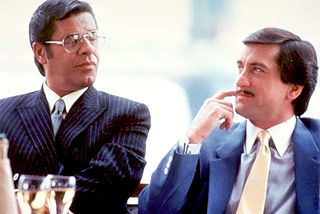 Featuring Robert De Niro in one of the most unique film roles of his career, “The King of Comedy” tells the story of Rupert Pupkin, an aspiring stand-up comedian who kidnaps a popular talk show host (Jerry Lewis) when he’s denied the chance to perform his routine on the late-night program. Considered a drama by the fine people at Blockbuster, the film is actually more of a dark comedy than anything else. Highly underrated and remarkably unheard of, “The King of Comedy” also co-stars Sandra Bernhard in perhaps the only good film of her career. It may not be Scorsese’s Pride & Joy (a bit of an inside joke for anyone that has seen the movie), and it may not even be among his best, but it’s definitely an interesting study of the mass media that probably would have had a bigger impact today than it did during the early ‘80s.
Featuring Robert De Niro in one of the most unique film roles of his career, “The King of Comedy” tells the story of Rupert Pupkin, an aspiring stand-up comedian who kidnaps a popular talk show host (Jerry Lewis) when he’s denied the chance to perform his routine on the late-night program. Considered a drama by the fine people at Blockbuster, the film is actually more of a dark comedy than anything else. Highly underrated and remarkably unheard of, “The King of Comedy” also co-stars Sandra Bernhard in perhaps the only good film of her career. It may not be Scorsese’s Pride & Joy (a bit of an inside joke for anyone that has seen the movie), and it may not even be among his best, but it’s definitely an interesting study of the mass media that probably would have had a bigger impact today than it did during the early ‘80s.
What Were You Thinking?
“Bringing Out the Dead”
Bringing Out the DeadMarty’s attempt at resurrecting the neo-noir isn’t particularly horrible, but it’s a jumbled mess of good ideas that never quite cements. Nicolas Cage stars as Frank Pierce, a paramedic in despair from witnessing too many lives lost in the past years. Supporting turns by John Goodman, Ving Rhames and Tom Sizemore are all darkly comic, but the main story is just so boring that it hardly holds your interest. It’s not completely worth avoiding, and could even be called an achievement for many directors, but we’ve all come to expect a lot better from Scorsese.
See which other great directors made our 2007 induction class in our Directors Hall of Fame.



